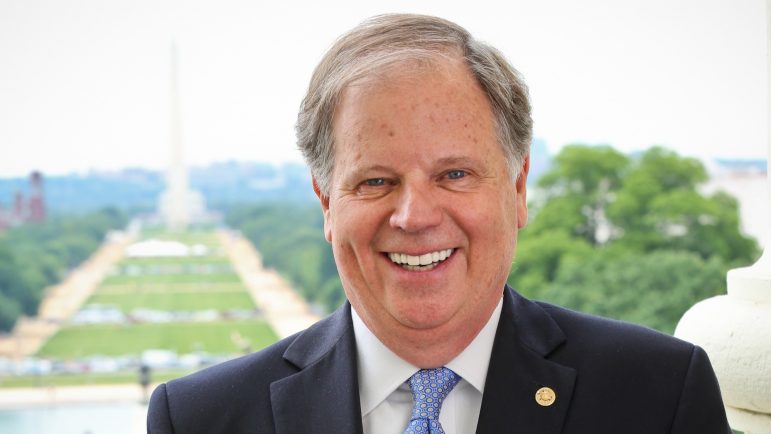U.S. Senator Doug Jones says he is trying to rebuild the Alabama Democratic Party, not destroy it. That’s in response to criticism leveled at him by state party chairwoman Nancy Worley. It’s also the latest detail in a leadership fight that’s embroiled Alabama Democrats.
Jones spoke about the situation surrounding the Democratic Party in Alabama, along with other topics, with WBHM’s Andrew Yeager.
The State Party’s Leadership Crisis
In August, the Democratic National Committee stripped credentials from Worley and Randy Kelley, vice chair of the state party, for failing to meet deadlines to pass new bylaws and hold new leadership elections. The national party had rejected a set of Alabama bylaws saying they were not in compliance. The DNC said more needed to be done to include representation for minority groups beyond African-Americans, such as Lantios, Asian-Americans, LGBTQ and youth members.
In a letter this week, DNC Chairman Tom Perez wrote that the Alabama party had “fallen short of meeting its basic obligations,” leading the DNC to withhold $10,000 in monthly funds. The DNC gives state parties a baseline contribution of $10,000 per month. If the situation isn’t resolved, Alabama might not have delegates at next year’s presidential nominating convention.
In response to the letter, Worley accused Perez and Jones of waging an “all-out attack” on Democrats in Alabama.
“No one needs to preach to me about doing things to destroy a party or attack a party. It’s being destroyed from within,” Jones says.
He says an independent investigator hired by the DNC found Worley’s election last year was fraudulent. Jones supported one of Worley’s opponents in that race.
“This is not any kind of attack on the party but an effort to build the party that has been virtually nonexistent over the last few years,” Jones says.
Jones says there’s not much else the DNC can do to pressure state party leaders, but he expects members of the State Democratic Executive Committee to push through new bylaws and hold new elections.
“I think things are going to start happening on that front very, very soon,” Jones says. “Before we know it we’re going to have new leadership and a new party.”
Jones on President Trump’s Hurricane Dorian Flap: An Innocent Mistake
Hurricane Dorian turned away from Alabama. But the state found itself at the heart of a political storm involving President Trump and weather forecasters.
President Trump tweeted on September 1st that Alabama will “most likely be hit (much) harder than anticipated.” The National Weather Service office in Birmingham quickly tweeted that Hurricane Dorian would have no impact on Alabama.
Through the week, Trump repeated multiple times that Alabama had been at risk of impacts from the storm. It culminated with a statement Friday from the National Oceanic and Atmospheric Administration, which oversees the NWS, disavowing the Birmingham office’s tweet.
President Trump denied reports the White House ordered NOAA to push back on the local office, but the situation has raised questions about whether politics is being favored over science. The Commerce Department inspector general and a House committee are investigating.
Jones says he’s withholding judgement for now on whether politics was involved. He says he believes the president made an innocent mistake, but is incapable of admitting he’s done something wrong. Jones says if an agency has to cover for a mistake, that calls into question future forecasting.
“I have great confidence in the weather forecasters that we have in Birmingham and around the state. They have saved lives,” Jones says. “I’m anxious to see the inspector general’s report … but if it [the statement] was somehow directed, if it was somehow done for political reasons, then I think heads need to roll.”
The acting adminstrator of NOAA spoke at a recent weather forecasters conference in Huntsville where he was
Jones on Gun Violence
Jones calls himself a supporter of the Second Amendment. He also says he supports “common sense gun reform.” He points to several ideas, the first being universal background checks.
“I don’t think that that is going to infringe on a law-abiding citizen’s ability to buy a firearm or sell a firearm,” Jones says.
Jones says lawmakers should consider extreme risk laws or “red flag” laws. Such laws allow a judge to temporarily take a gun or prevent a gun purchase from people deemed a risk to themselves or others.
“This would not be something you could just willy-nilly do. It would be a serious process,” Jones says.
Jones says the so-called “boyfriend loophole” should be closed. Federal law prevents those who have been convicted of some types of domestic violence from owning or buying a gun. But advocates say the law has a loophole in that it applies only if the abuser is or had been married to or had a domestic or parenting relationship with the victim. In other words, if the two merely dated, there’s nothing blocking the abuser from owning a gun.
Jones says now that Congress has lifted a ban on the Centers for Disease Control and Prevention conducting research on gun violence, lawmakers should put funding behind it.
“Let’s let the folks look at this like they do car crashes and baby cribs and other diseases that are out there,” Jones says. “Let’s study it and see what we can do to come out of it.”
At the same time, Jones is doubtful those proposals would make it through the current Senate. Senate Majority Leader Mitch McConnell has said he’s looking to President Trump for guidance on gun issues. Jones says Trump has flip-flopped on the issue of guns.
“I can’t say that I have a lot of confidence, but folks are going to continue to push,” Jones says.

